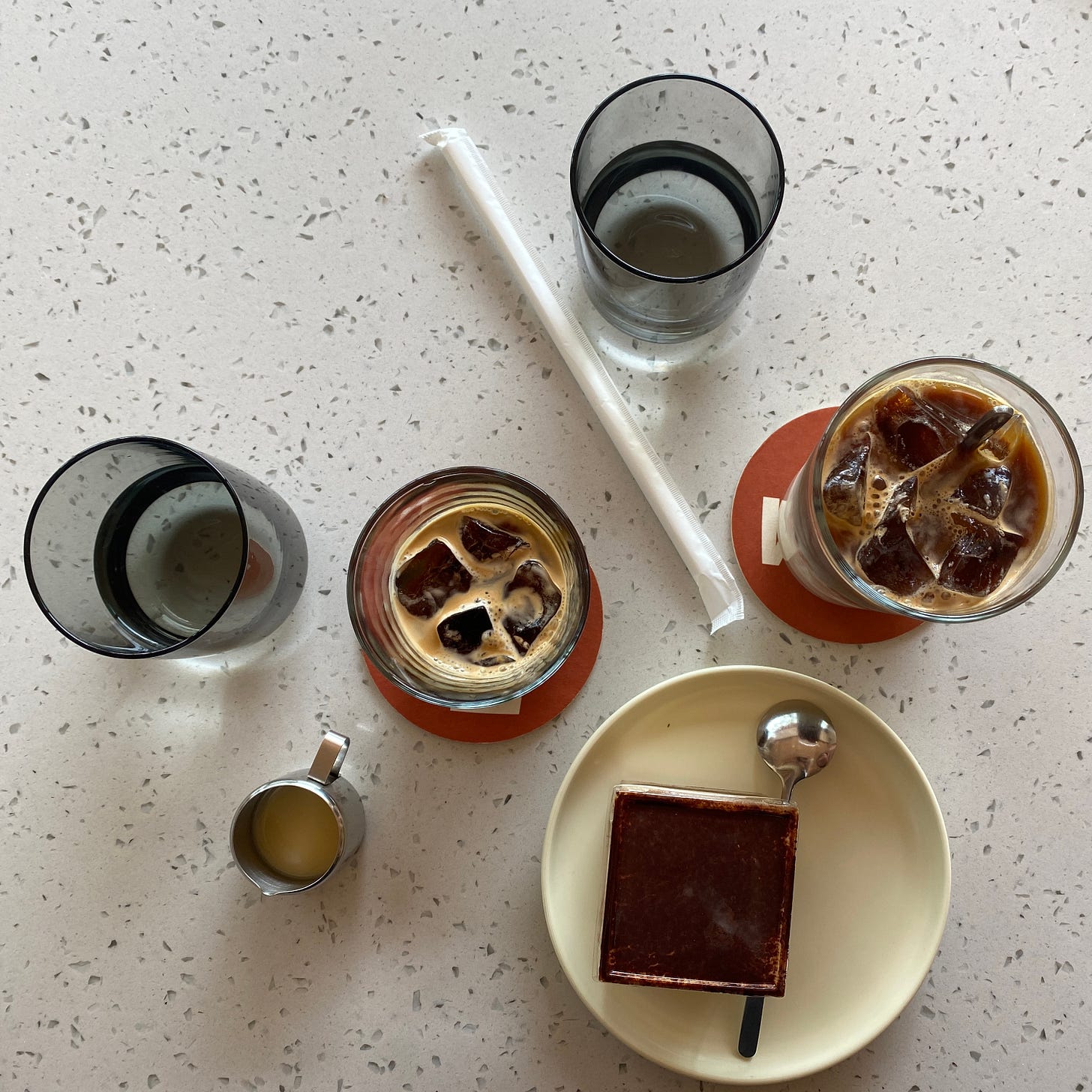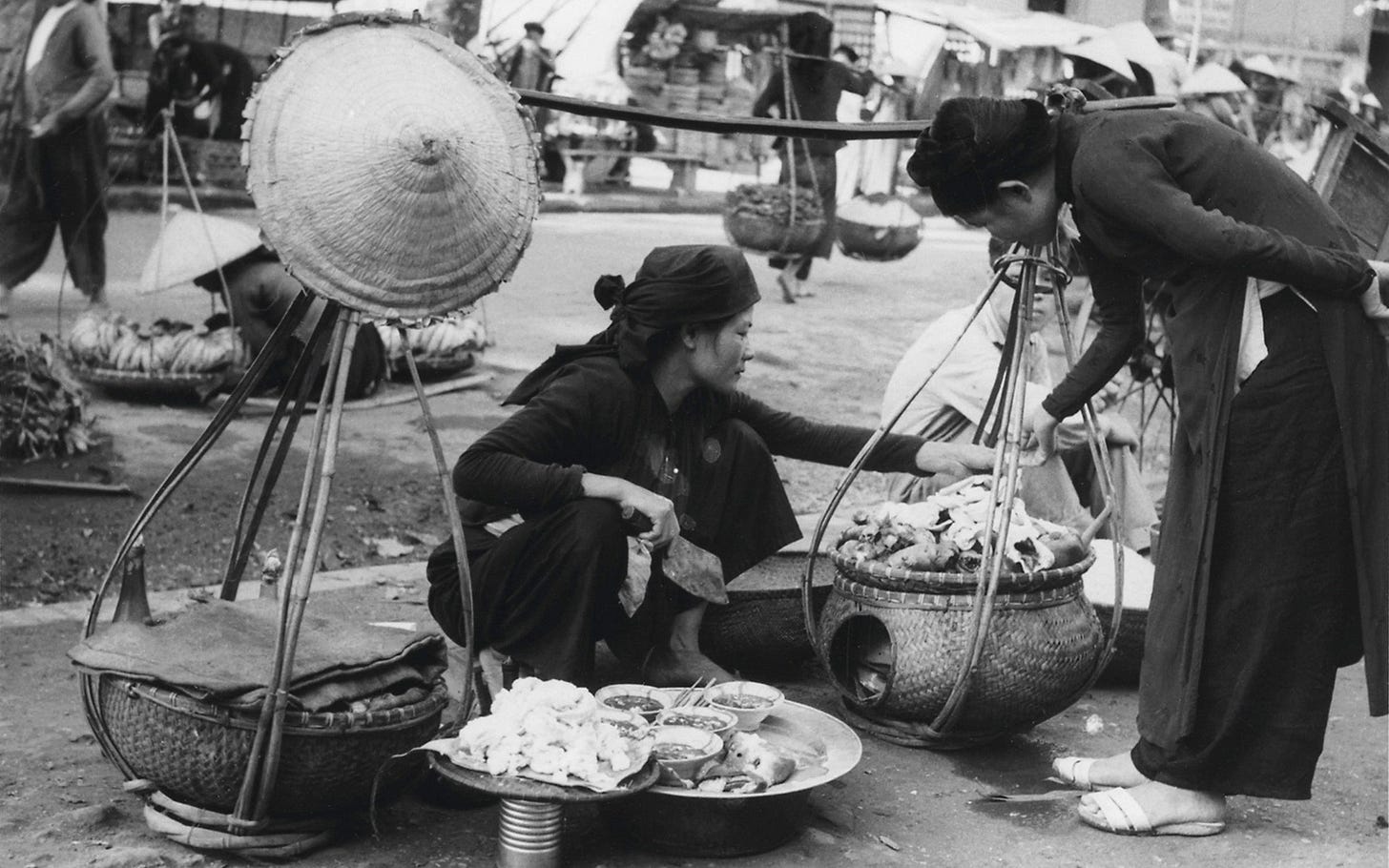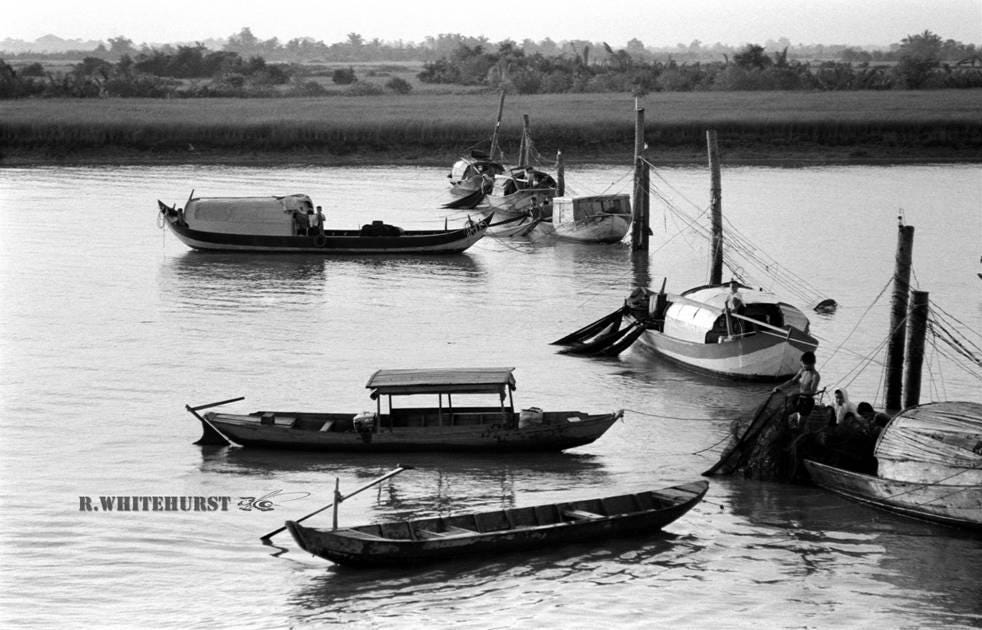My favorite moment in Hanoi was on a date. We had eaten a delicious meal sitting on blue plastic stools right by the chaotic streets, then found a beautiful cafe by the lake where I ordered coffee with condensed milk with an extra cake to share. We had been talking - I checked my phone - for nearly 4 hours now, as the sun dipped into the golden ripples across the tranquil lake. I think there’s a second date. Oh, and I even went back home with the person :))
…
The date was with my dad, haha. While I was home I asked both my parents on a date, and these two days were the most meaningful part of my travel. I now recommend it to every friend of mine. The structure is simple: you ask your parents for a date, do something that they really like (the easiest is their favorite food place), then take them to a cafe and ask them about their life story. Expect some surprises on their part, but if you block out enough time, prepare a few questions, and are willing to listen, it’s surprisingly easy - everyone wants to be known, especially by their kids. These few hours you spend could easily be the ones that you would remember for decades to come.
Ok but why do this?
My parents are incredible people, yet I struggle to connect with them. My dad in particular is the stereotypical Vietnamese man born in the 1960s, who would talk for hours on end about US-Russia politics whenever I call home, while urging me to get a husband real soon because I’m past marriageable age (I’m 24). Everything we talked about would easily devolve into an argument, like that one time when he said I should not do Computer Science … because guys do not like girls who are too smart :) Our dynamics were the fraught kind of relationship that clashed the stubbornness of a 20-something with the hardened-ness of a 50-something, because I have to get the genes from somewhere, right?
I had always thought our relationship would be like that - careful sidestepping, occasional big fights, distance. And then, in 2022, my dad had throat cancer.
I would call home regularly to check up on him, but as usual we barely conversed, my mom the telephone line. But it hit me the last time I got back. We were at the pho Thin place, where we would go every time I’m home. I just finished my bowl of the warm brothy soup, and turned to see my dad struggle to finish his own, his face squirmed as the food hit his throat. It left me quiet. Here was the once strong energetic man, who always carried my heavy luggage through three flights of stairs every time I’m back, the life of every party dancing like a madman, now in front of me, withered, thinner, the wrinkles of his face sunk deep. Perhaps for the first time, I felt viscerally the clock ticking1.
Then earlier this year, a friend mentioned briefly a project he himself had done where he interviewed his parents about their life. I went home and immediately started jotting down questions. 6 months later, I asked both my parents, Mom on Sunday and Dad on Monday, to dress up nicely, carried them on my motorbike, swerved around Hanoi finding a nice place for coffee, then opened my phone to hit record.
Both my parents were surprised when I told them about the interview. My dad asked what I was planning to do with it, which … I don’t know? I maybe want to do a write-up (which is this one I guess), but mostly I just want to know, for myself, how these people who knew me from the beginning of time had a life before me, one that I could only imagine. I just started with, “Tell me your earliest memory from childhood”, and off they went.
A story of the man who moved boats
Sometimes I forget how different their world was from mine. My parents were both born right when Vietnam War was ending - my dad was 7 years old when Vietnam became independent. War was embedded in his earliest memory, like how he would wear a hat made of rice straws everywhere to protect his head from sudden bombing. Another time he remembered seeing an American airplane flying over his head. Back then his family did not even have a thermos at home, nor electricity; his brother walked 2 hours every day to get to high school. The level of wealth and technology required to have a plane flying on the sky, in his mind, might as well be of an alien species.
Then there was poverty, lots of it. At 11, my dad would start walking to the wet market with his mother, carrying 10kg bags of rice on his head while trekking miles each way. His reward for a long day of walking was a small Vietnamese potato (củ từ), which, at the tip of his tongue after a day of labor, was sweeter than sugar. As he reminisced a smile appeared, he could still imagine the sweetness in his head.
When my dad was 16 he would go to the Red River and steer boats. Boats back then had no engines, so young men like him would use thick ropes wrapped around their body and pull the boats by their own forces, against the roaring waters, for 3-4 days until they got to the mountain, where they filled the boats with rocks for construction, then would pull the boats back for sales.
One day in the midst of winter, as the icy water splashed on him my dad would pull against the forces of the river, trying to get across a canal to shorten his trip. But the canal is where two rivers joined forces, the water flow changed drastically from each side. The pull was so strong that at one point the boat slipped, pulling him along across the river, flopping like a frog. He had to wait for another day before pulling across the water again, by himself, to rejoin the forces waiting for him at the mountain.
But my dad was lucky because he was the last born in the house. One of his brothers was smart enough so he could go to university in Hanoi, the capital of Vietnam. He would go back home and tell my dad to study hard and get out of the countryside. So my dad didn’t skip high school like most of his siblings, and even though he was not smart enough to get to college, he still got to Hanoi. There he once again started out as manual labor, before getting a job first as a security guard in the journalism company he still works at today. He started studying again for college, climbed up the rank to be a journalist, and met my mom. By the time I grew up in the middle of Hanoi, it was already a different life - crowded and loud, but comfortable, with little trace of the harshness of his life.
*
I don’t know, there’s something about hearing all the stories that made him as a person suddenly clear in my eyes - in big ways and small. Oh, this is why you insisted on going to that restaurant every time I’m back. … Ah, here’s why you care so much about what others think of you … Oh, I wonder if you still regret that decision you made back then. It’s like all the pieces floating around suddenly snapped into place, a singular line, and there it was, all the threads that led to him, here that afternoon, sipping condensed milk coffee looking over the banyan tree where the shades fell on the lake.
*
A friend commented when I told him about this project, ‘I don’t know, the thought brings a lot of discomfort for me. Guess I’m afraid to be that close to my parents.’ I think it’s true, when people are at arm-distance they cannot hurt you as much. To be close means to be willing to be influenced, be loved, and be hurt by the person you have let in. There were things my dad said that hurt me deeply in this interview. Is this closeness desirable when, in a blink of an eye, I am a kid crying over what my dad had said?
But maybe it is, for I see him now, my father, as a full being in all his deep flaws and greatness. In how I inherit both his stubbornness and determination. In how his confidence and pride are two sides of the same coin. In how he hurt me is also in so many ways, the way him as an imperfect human being, impulsive and rash and proud and kind, is learning to exist in this world.
There was a moment that sat with my heart, right towards the end of our interview. He was talking about when I was just turning 8 or 9, how every day in the summer we would take a nap together, and I would demand he tell stories to make me fall asleep. And he would make up nonsensical tales and I would giggle before dozing off. Somehow that memory brought tears to my eyes. Here was a person, who in his own ways is harsh and flawed, and yet has really really tried to love me for all his shortcomings. I am a product of his genetics, his life decisions, the ways that he raised me, and for all the ways that I have rebelled I am also a product of his love.
So here’s your homework for the holiday
If you are visiting home, schedule a time and ask your parents (or any loved ones) to tell you their life story. Ask about their childhood best friends, dream jobs as a kid, their life philosophy, all the things that made them them. We are often intentional about friendship or romantic partners, but the relationship with family is, in my mind, the most fraught but also the one with the most potential for richness. If you are planning to, here’s a few things that help:
Set a time and date beforehand, preferably a whole afternoon at the very least. My interview with Mom was 2 hours, with Dad was 6(!!) hours, split over two days. Have water, a phone to record, & something to take notes. I used a notebook and pen (something about having a laptop opened in front of you doesn’t give the right vibes).
Setting the tone is also important. For instance, sitting down at a cafe is better than while you’re on a walk (and could be interrupted by anything). Or if you both dress up, it also signals that it is an important occasion!
I had a list of questions beforehand, but I ended up not referring to it during the interview. I still think having a list of questions is valuable because it helped me remember details that I always wanted to ask my parents but never had the chance (e.g. How did you feel when ABC happened, etc.).
If you know other people in the family, it’s always a good question to ask (were you close with your mom/dad/brother/sister, did you have close friends in secondary school, etc).
If they veered off into politics/ advice giving etc, don’t be afraid to cut them off and steer back the conversation topic. When my dad started talking about the war he veered into Vietnam-China-US politics, so I just nudged him back with “You were telling me about the time when you saw the US planes. Anything else you remembered?”
If there are questions you don’t feel like you want to know the answer to, don’t ask! If there are things you want to take breather on, you can cut the interview short and continue another time too.
This is worth repeating: everyone wants to be known, and even more so parents by their kids. So come with an open heart, be willing to ask a few hard questions, and be willing to go with the flow!
Thank them in the end, give them a hug! & let me know how it goes :)
Thanks to Trang for reading, and for Gabriel for pushing me to publish.
My dad has gotten better! He did finish his bowl of bun oc when I came back home this winter :)









Greetings from a fellow Hanoian (is that even a term?). Your idea on interviewing parents to get to know them actually makes me rethinking on pushing back hard and resentful feelings growing up in a difficult family in order to connect with them. Anyhoo, I'm just curious on what is your intention on using the term "Vietnam war"? You mentioned that you were raised in Hanoi; hence, it just strikes me slightly intriguing. Love to hear your thoughts.